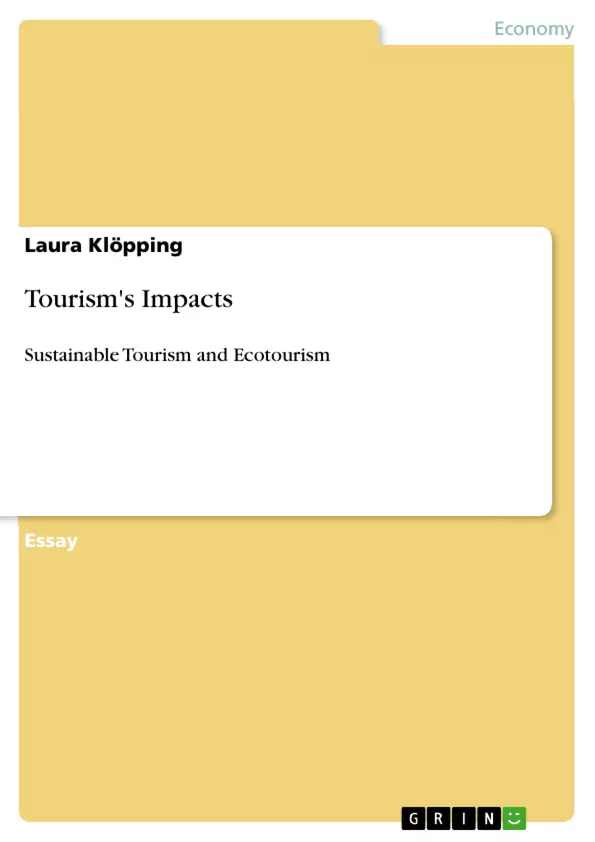As Hunter (1997) points out in his paper sustainable tourism is not a frigid framework, but should rather be seen as an adaptive paradigm, because there are different interpretations that are appropriate under different circumstances and many limitations concerning the research of impacts studies, such as difficulties to separate out the environmental impacts of tourism from the effects of other economic activities (Holden, 2001).
A coherent definition definitely has to be found to continue going further in the right direction, that has already been found. Because the approach that has been found is not a long-term solution and much of it is only used for marketing. What is actually missing is an ethical, environmental awareness of the mass, that already exists but is not enough to change the above mentioned environmental development.
Earlier or later a complete restructuring of tourism is necessary because the tourism industry is one of the fastest growing branches of economy and science and research have to adapt and are forced to develop and conceptualize new approaches.
At the same time the destination as an own system has to create the required framework conditions by realizing socio-cultural, ecological and economical problems of all kind.
Inhaltsverzeichnis (Table of Contents)
- Introduction
- Tourism's Impacts on the environment
- Sustainable Tourism and Ecotourism
- Conclusion
Zielsetzung und Themenschwerpunkte (Objectives and Key Themes)
This article aims to provide a comprehensive overview of tourism's impacts, particularly focusing on sustainable tourism and ecotourism. It explores the economic, environmental, and socio-cultural dimensions of tourism, examining both positive and negative impacts. The article also discusses various approaches to achieving sustainable tourism practices and the challenges associated with them.
- The environmental impacts of tourism
- Sustainable tourism development
- Ecotourism as a sustainable tourism approach
- The limitations of ecotourism and other sustainable tourism initiatives
- The need for a comprehensive understanding of tourism's impacts and ethical awareness to drive sustainable practices
Zusammenfassung der Kapitel (Chapter Summaries)
- Introduction: This section defines tourism and highlights its complexity, emphasizing the need for sustainable practices to ensure long-term economic and environmental viability. It introduces the concepts of sustainable tourism and sustainable development, emphasizing their interconnectedness and importance in tourism planning.
- Tourism's Impacts on the environment: This chapter explores the environmental impacts of tourism, differentiating between positive and negative, direct and indirect impacts. It examines how tourism can contribute to environmental degradation, particularly through resource depletion and pollution. However, it also acknowledges the potential of tourism to act as a driver for environmental protection and conservation.
- Sustainable Tourism and Ecotourism: This section delves into the concept of sustainable tourism, emphasizing its focus on resource conservation and local community engagement. It explores different types of innovations that can foster sustainable tourism practices and discusses the potential of ecotourism as a specific example. The chapter also considers the limitations of ecotourism, acknowledging that it may not be a panacea for all tourism-related problems.
Schlüsselwörter (Keywords)
This article focuses on the concepts of sustainable tourism, ecotourism, environmental impacts, tourism development, resource conservation, and ethical awareness. It explores the challenges of achieving sustainable tourism practices and the limitations of existing approaches. The discussion highlights the need for a comprehensive understanding of tourism's impacts and the development of innovative solutions to ensure the long-term viability of tourism.
Frequently Asked Questions
What is the difference between sustainable tourism and ecotourism?
Sustainable tourism is an adaptive paradigm focused on long-term viability, while ecotourism is a specific approach emphasizing resource conservation and local community engagement.
What are the main environmental impacts of tourism?
Tourism can lead to resource depletion and pollution, but it also has the potential to drive environmental protection and conservation efforts.
Why is ethical awareness important in the tourism industry?
The article argues that mass ethical and environmental awareness is missing and is necessary to drive real change beyond just using "sustainability" as a marketing tool.
What are the limitations of current tourism impact studies?
It is often difficult to separate the specific environmental impacts of tourism from the effects of other general economic activities in a region.
Why is a restructuring of the tourism industry necessary?
Because tourism is one of the fastest-growing economic sectors, science and research must develop new approaches to manage its rapid expansion sustainably.
- Arbeit zitieren
- Laura Klöpping (Autor:in), 2011, Tourism's Impacts, München, GRIN Verlag, https://www.grin.com/document/189313



